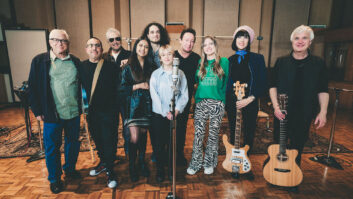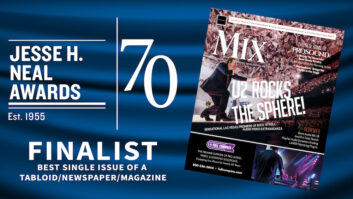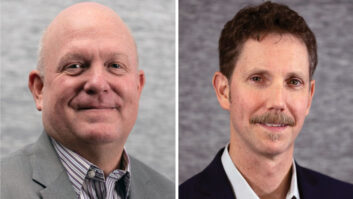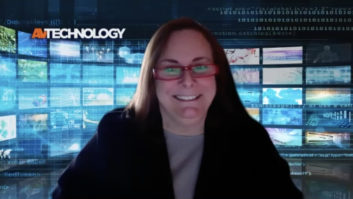“Welcome to the GSPoT!” the kid grinned at me. “Mr. Grumpmeier told us you were coming. We’re really happy you’re going to write about us in Mix magazine. Around here, you know, we don’t only look at the pictures, we sometimes even read it!”
Well that’s nice, I thought, and smiled back at the young assistant. His purple hair matched the plush, yet hideous, heavy-duty indoor/outdoor carpeting that ran on for what seemed like miles, under which you could still smell the glue drying. I was amazed by how fast this place had gone up. Four recording rooms, three control rooms, a post suite, a screening room, a CD/DVD duping operation, a tape-baking kitchen, a sushi bar and a Starbucks were now occupying what had just a few months ago been the tire and automotive section of a busy department store.
“There you are.” Grumpmeier came out of a doorway, giving me a hale-fellow-well-met grimace that was the closest he could ever come to a smile. “You found us!” “It wasn’t hard,” I replied. “The Big Red K in the parking lot helped a lot. But tell me again what you call this place.”
“The GSPoT!” he said triumphantly. “Stands for ‘Grumpmeier Studios Post and Transformation.’ I figured that would get people in here faster than if I named it after some drink or the godforsaken part of town we’re in. But you can’t beat the rent. That discount chain’s stuck with a 30-year-lease that they can’t get out of, and with the commercial real estate market in the dumper, they were desperate.”
“So you got a good deal on the rent?”
“No, we got no rent. All we gotta do is pay the utility bills so the pipes don’t freeze and the landlord doesn’t sue them. ‘Course, I’m working on getting out of that, too.” It’s comforting to know that no matter how successful my friend Grumpmeier gets, he’ll always be the same cheap S.O.B. who once tried to sell me a Mac SE for Pro Tools, saying it was better than a new one because of its “vintage sound.”
“So, show me around,” I said, pulling out my notepad. “This is quite a step up from the place you used to have in your basement. And that fallout shelter in the yard your kid was using for a while. What have you got here, like nine rooms?” “More or less,” he waved his hands vaguely. “We’re constantly changing things, so it’s hard to say exactly. But I’ll tell you all about that later. Right now, I want to show you some of these really cool new products I’ve discovered.” Grump loves to go to trade shows that no one else seems to know or care about, like the Kirghizstan Broadcast Union and Winter Wheat Farmers Fair, and has been known to come home with some pretty strange stuff.
“I found this really tiny company in Colombia called Morningside Hockwerks,” he said as he opened the door to a control room that bore a striking resemblance to the main room in the old Power Station. “They’ve taken a vocal processor and a reverb simulator and combined them into what they call a ‘Vimulator.’ They give you this whole library of FIR analyses of the nose, throat and chest cavities of famous singers who are retired, or should be, like Grace Slick, Diana Ross and Tony Orlando. Then you can apply those algorithms to any vocal track, and they’ll come out sounding like the model. In tune, out of tune, tight or sloppy, dynamic or condenser mic, whatever you like.”
“But don’t those singers object? I mean, didn’t Bette Midler win a lawsuit against some ‘soundalike’?”
“Yeah, well, Bette’s not in here. And neither is Springsteen, nor Tom Waits, but if you take Louis Armstrong and turn up the ‘smoke’ parameter, you can get pretty close. The company pays royalties to all the singers they model, and most of those folks are happy to get them. See this thing that looks like a parking meter? You drop a quarter in there and you can use any of their models for 15 minutes. At the end of the day, someone from the RIAA comes by and empties it.
“But it isn’t just for that. They also throw in a set of nasal and esophageal probes, which you use to make your own models. Of course, if you’ve got some kid who wants to sound like Eminem or Snoop Dogg, you have to get special probes that go into different body cavities. And there’s beginning to be a big underground market — literally — for models of singers who aren’t with us anymore. Hey, want to hear me sound like Jim Morrison? This is the end…”
“Uh, no, that’s fine. I’ll take your word for it.” I cut him off. “But that doesn’t sound like something a lot of clients will use. I mean, besides Harry Connick, how many Frank Sinatra wannabes are out there?”
“Oh, no, there’s tons of ways we can make money with this sucker. The government keeps us real busy. We have profiles for a lot of political types in the can, and whenever one of them says something really idiotic, they send us the videotape. We bring in an actor to redo the voice and replace the dumb stuff with something more innocuous. Do you know how many ways there are to mispronounce the word ‘nuclear’? Since our audio quality’s usually much better than what the network news shows have — what with those cheap camcorders they’re all using now — they’re happy to throw out their own tapes and use ours. And so nobody ever has to hear what the jerk actually said. But the networks really love us because of the reality shows.”
“Huh?” I was getting dizzy. “You mean those, uh, bachelorettes all want to sound like, I don’t know, Jennifer Lopez?”
“No, the girls all want to look like Jennifer Lopez, but we can’t help them there. But think about it: There they are slogging through some swamp, or being chased down an alley by a couple of cop cars, or hanging on a cliff while stuffing maggots up their nose. How’re you going to get a decent audio track out of that? And, none of them know how to loop dialog, so you can’t fix it in post, even if they’re not in custody. But if we can get them to come in for 15 minutes, even in handcuffs, we can create a profile on them, and then anytime we want, we get a professional to do the looping and it sounds just like them. We’ve saved a lot of shows that way. And since you never hear the actors’ real voices, they don’t even have to pay them scale.”
I had to sit down. This was deviousness beyond even what I thought Grumpmeier was capable of. But it turned out I hadn’t seen anything yet. As I slumped down in a huge leather chair that felt suspiciously like a milk crate, I noticed a dusty sign in the corner that said “Grump Post and Beam.” I figured this was a relatively safe line of questioning, so I asked him about it. “Oh, that was a name we came up with for the place a long time ago. Sort of a pun, but not really. We didn’t use it ’cause it gave away a little too much.”
“What do you mean?” I puzzled. “I’ll show you,” he snickered, as he pushed through a door marked “Folodeck.” All of a sudden, we were in what I could have sworn was the Taj Mahal.
“The simulation stuff we do isn’t just audio. It’s visual, too. And even tactile. We tell the clients this is our Foley room, but it’s much more than that. In this room, we can build any kind of space, from a downtown nightclub toilet to Middle Earth exteriors, and make it absolutely right. Remember the Total Information Awareness program the Justice Department wanted to set up? Well, even though the Senate cut off its budget, they went ahead with it, but they needed to find, uh, alternate means to fund it.”
“Don’t tell me,” I said, “Some colonel in the White House basement is shipping pirated CDs and MP3s to Chinese school kids?”
“Nothing that lame,” he scoffed. “Besides,” he intoned somberly, “that would be wrong. See, they put tons of surveillance equipment all around the world, tapping into wireless LANs, Webcams and cellphones, and they’re using technologies I’m not even allowed to talk about. They got together this unbelievable database that makes Google look like an iPod. Not only has it got complete credit, medical, political, educational and employment histories of every person on the planet, but it also has analysis of every place on the planet, with dimensions, colors, lighting data, temperature, humidity, textures, ambient noise and acoustics. So to pay for it, they came up with this brilliant idea of a government/industry partnership. They’re selling access to it. It’s called the Official Repository of Worldwide Environments and Landscapes: ORWEL.”
“How many people know about this?” I gasped. “Not many,” he cackled. “They’re starting slow. They’re only bringing in partners who are absolutely trustworthy and who they know aren’t going to abuse the data. I got friends in the Agency.” (I didn’t know exactly which agency he was talking about, but the capital “A” was unmistakable.) “So, we’re one of the first commercial subscribers. The others I know about are a group who are direct-marketing really revolutionary ways to improve your sex life, and a former government minister from Nigeria, or maybe Zimbabwe, who seems to have gottten his hands on a bunch of venture capital and is looking for partners.”
“But what do you use it for?” I still didn’t get it. “Don’t you see?” he looked at me condescendingly. “We can create any setting a client would want and then record in it. We can do music, Foley or ADR. We can make a two-chord garage band feel like they’re playing Shea Stadium. A guy doing a voice-over for a wild-animal series can think he’s in the Amazon jungle. Last week, we put the Three Tenors on top of Mount Fuji. With all that simulated wind around them, they really had to sing loud. One of ’em, Fiorello or whatever his name is, got pneumonia, but they sounded great! We’re booked up in here for weeks in advance.”
“That’s amazing,” I said, truly amazed. “Are you going to expand past this one room?”
“Well, that’s what I wanted to tell you earlier,” he said, lowering his voice. “As it happens, the whole facility is set up with ORWEL. The last tenants, that department store? They wanted all of the housewives buying the cheap linens and kitchen stuff think that they were in Martha Stewart’s house. They had it put in, but they never got the chance to use it. When we turned it on, we realized we could get profiles of some places that our customers would like: All of the best control rooms all over the world, or those great old recording spaces that don’t exist any more, or a place that’s just loaded with gear, like a Guitar Center. So, that’s what we did. Thanks to ORWEL, we’re literally beaming all those places in.” He pulled a car-key remote out of his pocket that said “Kia” on it. “That’s so nobody even thinks of stealing it,” he chuckled as he pressed a small button.
In an instant, the entire studio complex disappeared. All that was left was the ugly carpeting and bare concrete walls, stained a sickly blue where the stacks of antifreeze bottles once stood. The chair I was sitting on really was a milk carton. On the other side of what was now a huge open space, the young assistant who had first greeted me sat at a bridge table, headphones clamped on tightly, staring intently at a laptop. After a few seconds, he looked up, smiled and waved at us. “Sammy here is taking care of our whole operation. We often have him handling four sessions or more at a time. He’s got control over a couple of hundred tracks of audio, more processing than he’ll use in his entire lifetime, instant video sync, surround encoding, 20,000 loops, 30,000 sound effects online and 350,000 samples, and all those vocal models. It’s all in that iBook. When there are no clients around, we turn off the projectors to save power. That expensive stuff with the dials and knobs and lights? We don’t need it anymore. We sold everything from my old place on eBay, and I never bothered to replace a thing.”
Of course, I was horrified. “So, the whole place is just an illusion? All those clients think they’re sitting in a state-of-the-art facility and it’s really a hologram? None of this is real?”
“What’s ‘real’?” he scoffed. “You don’t have to be able to sing to have a hit. You don’t have to know jack about music to be a producer. You don’t have to play an instrument to write songs or soundtracks. You can make all the records you want without ever recording anything. So what do we need all that expensive stuff for? We’ve got no overhead, which means we can finally make some money. How long has it been since a client gave you a decent budget to do a project? Everyone’s hurting, everybody’s low-balling. You pay the bank for the equipment, you pay the staff and the rent and the light bill, and there’s nothing left. But get rid of all that stuff, and you get to take something home.
“Go virtual, bucko. This is the future. Get used to it.”
Paul Lehrman is recovering nicely, thank you.







